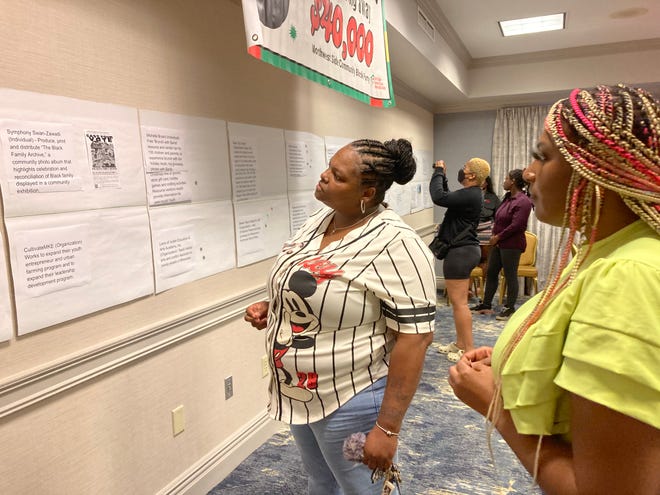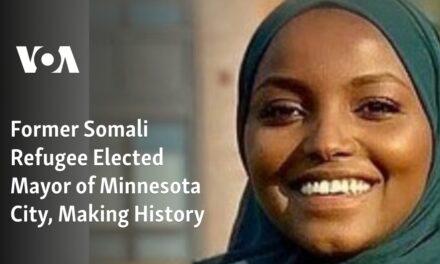
Lisa Davis mulled over the paper-lined wall in a hotel meeting room intently. On it were nearly 30 projects proposed by northwest-side residents to provide resources and services to help their community.
Projects listed on the 20-foot-long roll of paper ranged from creating a social club to address youth mental health, to installing air-quality monitors to combat environmental injustice, to funding a trip to Washington, D.C., to help youth understand democracy, to remodeling a church kitchen to provide community meals.
Davis placed her quarter-sized dot next to a program called Korey’s Kids, a nonprofit that provides families in need with diapers, clothing, food and toys.
“Anything about the kids, I’m down for,” said Davis, 41, who admitted she came to support Korey’s Kids, her best friend’s organization. “Some people have some good causes on why they’re trying to help the community.”
Davis voted along with nearly 40 others in African American Roundtable’s community-led participatory budgeting project last week at the Hilton Garden Inn.
The initiative allows northwest-side residents to propose programs and then vote on which ones share in $40,000 in grant money. AART staked its own money to fund four grants of up to $10,000 each for the project.
Residents can go online to read about each program and vote for their choice. Voting is only open to northwest-side residents 14 years or older and continues until Oct. 6. Nearly 200 votes have been cast since voting began two weeks ago.

“Folks who applied are proposing things that will make a tangible difference on the northwest side of Milwaukee,” said Devin Anderson, AART’s membership and coalition manager.
That the projects were all proposed by northwest-side residents demonstrates they have the ideas and skills to address their community’s needs if given the financial means through a participatory budgeting process, Anderson said.
Participatory budgeting is a democratic process in which residents have a say in how to spend some of a city’s public dollars. AART has long pushed the Common Council to adopt participatory budgeting. This effort aims to show that it’s a viable option for the city.
“With participatory budgeting — to some degree — you are taking away power from elected officials,” Anderson said. “But we want to encourage elected officials to see that not as taking away power from them, but actually giving power and empowering the residents they serve.”
Anderson said community programs like these rarely get funded because they don’t meet the city’s criteria. The city, he said, may not support a collective because it doesn’t have the infrastructure to handle city funds, doesn’t have nonprofit status or doubts the vision can be executed.
AART was intentional in making the application process easy, with as few restrictions as possible.
“We know so many of our people have the ideas and can execute the ideas but don’t always have the right paperwork or the right certification,” Anderson said.
The effort is also about investing in the northwest side, which the AART says has been neglected for years.
“When you think about a lot of Black organizations in Milwaukee, a lot of them are doing the work in the central city,” AART Executive Director Markasa Tucker-Harris said. “We notice there’s not a lot of organizing and supporting folks on the far northwest side.”
The organization, she said, decided to pool its money to make that investment here when a lot of the city officials won’t.
“We are trying to continue to grow and build power on the northwest side of Milwaukee,” Anderson said.

Serita Valmond’s proposal is among those listed on the wall. Valmond wants to create a group coaching program that teaches holistic pain management. The funding would allow her to expose more Blacks to alternative medicine since it’s often not covered by insurance.
The program will provide education on nutrition, stress management, proper movement and how emotions affect the body.
“If you don’t process your emotions or any of your trauma, they manifest in the body and come out as physical pain and ailments,” said Valmond, 42, who specializes in Reiki, a Japanese form of energy healing, and is a certified master coach in chronic pain management.
Sisters Betty and Rhonda Hill are seeking funding for separate projects. Betty Hill’s Celebration of Life project focuses on women who’ve experienced hardships, while its sister program, Power Gurlz, supports their daughters with mentorships and community-service activities.
“Both entities are really about community engagement but building relationships,” said Betty Hill, 38.
Rhonda Hill, 43, wants to use the money to create safe spaces for Blacks to gather that alleviate racial trauma, social isolation and loneliness.

She applauded AART for empowering residents — giving them an opportunity to pick what this group should focus on. Trying to find funding for her project can be challenging. But this initiative helps level the playing field.
“This is meant to be an opportunity for Black people on the northwest side,” Rhonda Hill said. “That already gets rid of one barrier.”



